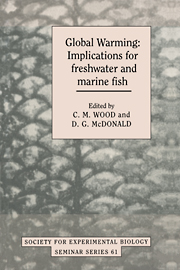Book contents
- Frontmatter
- Contents
- List of contributors
- Preface
- Temperature thresholds for protein adaptation: when does temperature start to ‘hurt’?
- Membrane constraints to physiological function at different temperatures: does cholesterol stabilize membranes at elevated temperatures?
- The effect of temperature on protein metabolism in fish: the possible consequences for wild Atlantic salmon (Salmo salar L.) stocks in Europe as a result of global warming
- Thermal stress and muscle function in fish
- Factors which may limit swimming performance at different temperatures
- Effects of temperature on cardiovascular performance
- Temperature effects on the reproductive performance of fish
- The effects of temperature on embryonic and larval development
- Temperature and growth: modulation of growth rate via temperature change
- Effects of climate change on cod (Gadus morhua) stocks
- Temperature effects on osmoregulatory physiology of juvenile anadromous fish
- Effects of temperature on xenobiotic metabolism
- Interactive effects of temperature and pollutant stress
- Behavioural compensation for long-term thermal change
- Thermal niche of fishes and global warming
- Index
Membrane constraints to physiological function at different temperatures: does cholesterol stabilize membranes at elevated temperatures?
Published online by Cambridge University Press: 05 November 2011
- Frontmatter
- Contents
- List of contributors
- Preface
- Temperature thresholds for protein adaptation: when does temperature start to ‘hurt’?
- Membrane constraints to physiological function at different temperatures: does cholesterol stabilize membranes at elevated temperatures?
- The effect of temperature on protein metabolism in fish: the possible consequences for wild Atlantic salmon (Salmo salar L.) stocks in Europe as a result of global warming
- Thermal stress and muscle function in fish
- Factors which may limit swimming performance at different temperatures
- Effects of temperature on cardiovascular performance
- Temperature effects on the reproductive performance of fish
- The effects of temperature on embryonic and larval development
- Temperature and growth: modulation of growth rate via temperature change
- Effects of climate change on cod (Gadus morhua) stocks
- Temperature effects on osmoregulatory physiology of juvenile anadromous fish
- Effects of temperature on xenobiotic metabolism
- Interactive effects of temperature and pollutant stress
- Behavioural compensation for long-term thermal change
- Thermal niche of fishes and global warming
- Index
Summary
Introduction – impact of global warming on membrane physiology
Consequences of poikilothermy: perturbation of membrane structure
Because temperature determines the rates of biological processes as well as the distribution of conformations assumed by both molecules and molecular aggregates (e.g. membranes) in cells (Hochachka & Somero, 1984), physiological function is markedly perturbed by fluctuations in body temperature. Thermal perturbation of function is particularly acute for aquatic poikilotherms such as fish, for the high heat capacity and relatively low oxygen content of aquatic environments combine to ensure that, as a consequence of respiration, the body tissues remain within 1 °C of ambient water temperature (Carey et al., 1971). One of the primary consequences of poikilothermy in fishes is the perturbation of membrane organization when body temperature changes, for the structural lipids of biological membranes display complex phase behaviours and physical properties that are exquisitely sensitive to temperature (Hazel, 1995). Temperature effects are most evident as altered physical properties of the phospholipid acyl domain, which in turn determine the order (time-averaged position in space) and rates of motion of membrane constituents, the molecular geometries of membrane phospholipids, and the dynamic phase behaviour of the membrane. At normal physiological temperatures (i.e. the temperature to which an animal is either acclimated or adapted), the fatty acyl chains of membrane phospholipids are moderately disordered an relatively fluid due to the presence of 3–7 gauche rotamers (rotations about carbon–carbon single bonds) per acyl chain (Casal & Mantsch, 1984); however, in spite of this disorder, the average molecular geometry of most phospholipid molecules is essentially cylindrical.
- Type
- Chapter
- Information
- Global WarmingImplications for Freshwater and Marine Fish, pp. 25 - 50Publisher: Cambridge University PressPrint publication year: 1997
- 5
- Cited by



